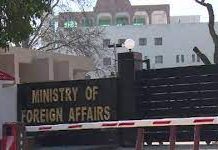ISLAMABAD, Sep 05 (APP):Director General of the Provincial Disaster Management Authority (PDMA) Balochistan, Jahanzaib Khan Ghorezai, announced on Thursday that disaster preparedness and response knowledge among provincial authorities has improved due to frequent natural calamities. However, he emphasized the need for additional resources to ensure the resilience of communities across Balochistan.
Speaking at the inception workshop of the “Integrated Disaster Preparedness (DP) for Resilience Building” project by the World Food Programme (WFP), funded by the European Civil Protection and Humanitarian Aid Operations (ECHO) and co-partnered by the UN’s Food and Agriculture Organisation (FAO), Ghorezai highlighted the ongoing progress in the PDMA. He noted that the agency has reduced bureaucratic hurdles and improved coordination with stakeholders and donor organizations involved in humanitarian efforts. Support from the National Disaster Management Authority (NDMA) and international agencies has helped modernize the PDMA’s operations and disaster management tools.
Ghorezai stressed that community engagement is vital for effective disaster preparedness. “Without involving the communities and understanding their concerns and vulnerabilities, we cannot devise effective contingency and resilience-building strategies,” he said.
Idrees Mahsud, Member of Disaster Risk Reduction (DRR) at the NDMA, briefed participants on the role of the National Emergencies Operation Center (NEOC). The NEOC provides real-time disaster monitoring, enabling timely early warnings, advisories, and alerts to protect communities and resources. He emphasized the need for integrated disaster preparedness efforts to build resilience at the grassroots level.
Senior official from the WFP in the welcome note said, “Pakistan is a country that has faced recurrent disasters—both natural and human-made. From floods and droughts to earthquakes and other emergencies, these events have continuously tested the resilience of the people, the economy, and the environment. The ongoing challenges underscore the urgent need for stronger disaster preparedness and response systems, particularly at the community level.”
“WFP, as part of its global mandate, is deeply committed to supporting Pakistan’s efforts to enhance disaster preparedness. Through this project, funded by ECHO and in collaboration with our esteemed partners, including the Food and Agriculture Organisation (FAO), our aim is to strengthen the institutional and operational frameworks that will enable swift and effective response mechanisms, thereby minimizing the impact of disasters on vulnerable populations,” it said.
The WFP’s project, “Pakistan – Integrated Disaster Preparedness (DP) for Resilience Building,” aims to strengthen disaster preparedness systems, including anticipatory actions, across national, provincial, and district levels. It will be implemented in Nushki District, Balochistan, and Khairpur District, Sindh. The workshop introduced the project to stakeholders and partners, facilitating consultations to ensure optimal outcomes and the achievement of project goals.
The workshop concluded with the development of a collaborative strategy to enhance institutional capacity and disaster preparedness systems. It involved officials from national, provincial, and district disaster management authorities, as well as other government departments such as the Pakistan Meteorological Department and the Irrigation Department.
مضمون کا ماخذ : Raging Rhino














